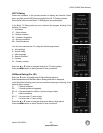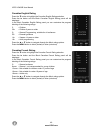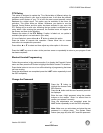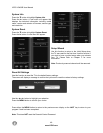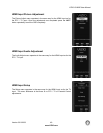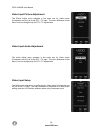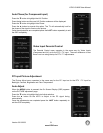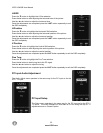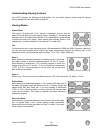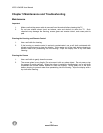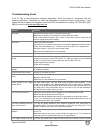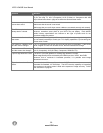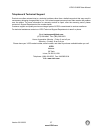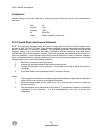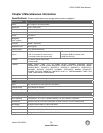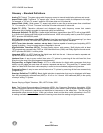
VIZIO VO400E User Manual
Version 9/21/2009 53
www.VIZIO.com
Understanding Viewing Features
Your HDTV features the following viewing modes. You can switch viewing modes using the remote
control, please follow the instructions in page 30.
Viewing Modes
Normal Mode
The original 4:3 aspect ratio (1.33:1 source) is preserved, so black bars are
added to the left and right of the display image. Standard TV broadcasts are
displayed with a 4:3 Aspect Ratio. Movies in 4:3 Aspect Ratio may be referred
to as pan-and-scan or full frame. These movies were originally filmed in 16:9
(widescreen), and then modified to fit a traditional TV screen (4:3).
Full
Full mode allows you to view the entire picture. Recommended for HDMI and RGB / Computer viewing so
you can see the complete picture without the image overstretching beyond the viewing area. If you
experience “noise” along the border switch to Zoom 1. For 720p, 1080i, 1080p only.
Zoom 1
When watching a standard broadcast or full-frame movie in this mode,
the display image is stretched proportionately to fill the TV screen.
When watching a widescreen (1.78:1 source) program or movie, the
display image fills the TV screen. If you are watching a widescreen
(1.85:1 or 2.35:1 source) program or movie, there will still be black
bars at the top and bottom.
Zoom 2
Zooms in by 14% to crop the top and bottom bars for 2.35:1 film resolutions. For 480i/p, 4:3 only.
Stretch Mode
When watching a widescreen program (1.78:1 source) with black bars on
the sides, the display image will stretch to fill the TV screen. People will
appear wider than they really are. If you are watching a widescreen
(1.85:1 or 2.35:1 source) program or movie, there will still be black bars
at the top and bottom. This mode is available only when watching a
widescreen program.
Panoramic Mode
When watching a standard broadcast or full frame movie in this mode,
the 4:3 Aspect Ratio (1.33:1 source) display image is stretched
horizontally on the left and right sides to fill the TV screen. The center
of the image is not stretched.



